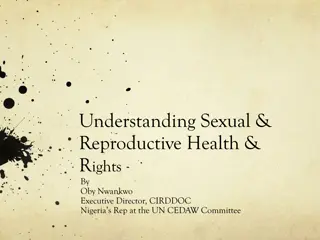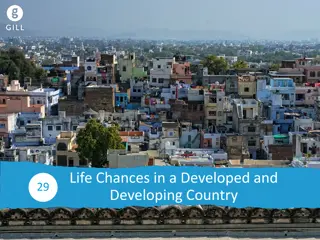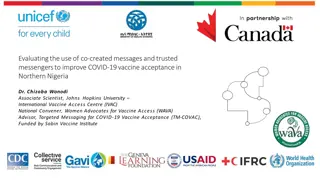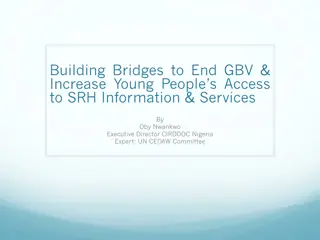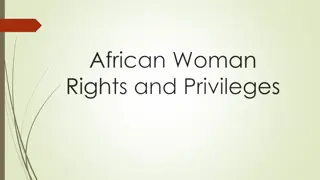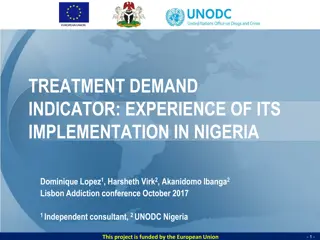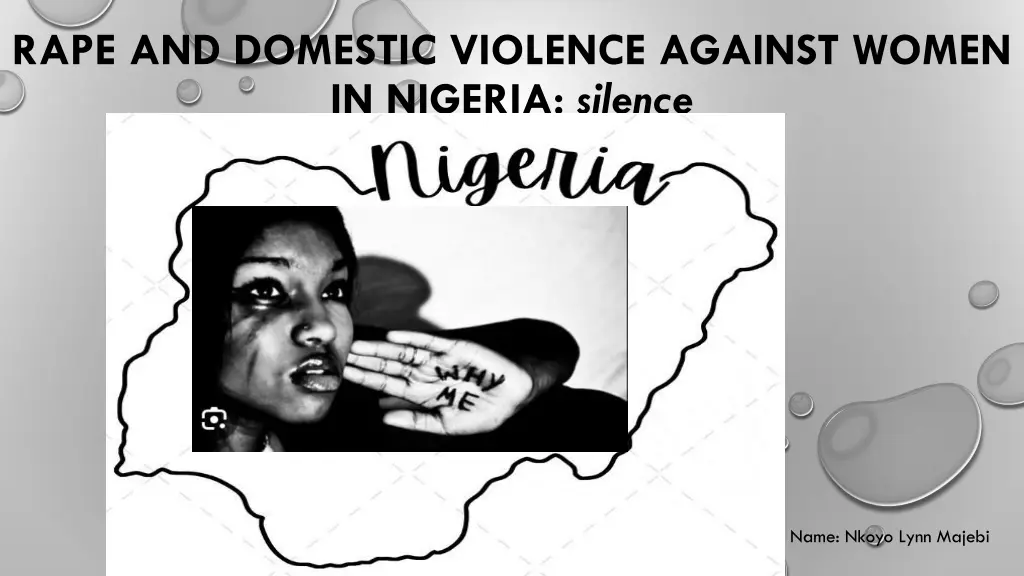
Women's Rights in Nigeria: Addressing Rape and Domestic Violence
Discover the challenges of rape and domestic violence against women in Nigeria, from cultural norms to legal frameworks. Learn about the prevalence, causes, and societal responses to combat this issue. Explore the role of the media and NGOs in supporting victims and advocating for change.
Download Presentation

Please find below an Image/Link to download the presentation.
The content on the website is provided AS IS for your information and personal use only. It may not be sold, licensed, or shared on other websites without obtaining consent from the author. If you encounter any issues during the download, it is possible that the publisher has removed the file from their server.
You are allowed to download the files provided on this website for personal or commercial use, subject to the condition that they are used lawfully. All files are the property of their respective owners.
The content on the website is provided AS IS for your information and personal use only. It may not be sold, licensed, or shared on other websites without obtaining consent from the author.
E N D
Presentation Transcript
RAPE AND DOMESTIC VIOLENCE AGAINST WOMEN IN NIGERIA: silence Name: Nkoyo Lynn Majebi
OVERVIEW Definition: Rape: unlawful sexual intercourse without consent, often involving force or threats. Domestic violence: physical, emotional, sexual, or psychological abuse within intimate relationships. Focus: The widespread issue of rape and domestic violence against women in nigeria, its causes, effects, and measures to combat it. Igbolekwu, c. O., Arusukwu, O., Nwogu, J. N., Rasak, B., Asamu, F., & Osueke, N. O. (2021)
PREVALENCE OF RAPE AND DOMESTIC VIOLENCE IN NIGERIA Statistics: UN reports: 1 in 4 Nigerian women aged 15-49 have experienced physical violence. Underreporting: many cases are not reported due to stigma, fear, or lack of trust in law enforcement. Cultural context: Patriarchal society: women are often viewed as subordinate, which contributes to violence against them. Social acceptance: domestic violence is sometimes normalized, with some considering it a family issue. Ogbonnaya, I. N., Fawole, O. I., & Rizo, C. F. (2021) Mshelia, I. I. H. (2021).
CAUSES OF RAPE AND DOMESTIC VIOLENCE Cultural norms: Traditional gender roles reinforce male dominance. Bride price customs sometimes lead to the belief that women are property. Economic dependence (Inequality): Women s financial reliance on men can make it difficult to leave abusive relationships. Weak law enforcement: Inconsistent or weak legal responses. Few convictions for perpetrators of rape and domestic violence. Social stigma: Fear of shame and being ostracized prevents many victims from reporting. Victim-blaming is common, especially in cases of rape. Anifowose, O. A. (2021)
LEGAL FRAMEWORK The Violence Against Persons (Prohibition) Act, 2015: A federal law criminalizing domestic violence, rape, and other forms of abuse. Provides for protection orders and punishments for offenders. However, enforcement is weak, and some states have not domesticated the law. o o o Child Rights Act: Includes provisions to protect minors from abuse, though it has been adopted unevenly across states. o Challenges: Inadequate legal awareness among women. Corruption and poor response from law enforcement. o o Only 18 out of 36 Nigerian states have adopted the VAPP Act, meaning over half of Nigerian women are not fully protected by this federal law. 2015 VAPP Act: provides life imprisonment for rape and up to 5 years for domestic violence offences. CASE STUDY: A NIGERIAN POLICE OFFICER REPORTEDLY RAPES A 16 YEAR OLD GIRL TILL SHE LOST CONSCIOUSNESS, INSIDE THE POLICE STATION IN SOUTH IBIE EDO STATE OF NIGERIA. HTTPS://DAILYTRUST.COM/HOW-SERGEANT-RAPED-TEENAGE-SUSPECT-INSIDE-EDO-POLICE-STATION/ Bature, E. A. (2020)
ROLE OF THE MEDIA AND SOCIETAL RESPONSE Ngos and civil society: Organizations like Mirabel Centre provide support to victims of rape and domestic violence. Shelters, legal aid, counseling services, and advocacy for legal reform. Recent campaigns: #Saynotorape and #enddomesticviolence social media movements raise awareness. Increased public out-cry has led to government action, though progress is slow. The Mirabel centre, Nigeria's first sexual assault referral center, has provided medical and counseling services to over 7,000 rape survivors since 2013.
REFERENCES Igbolekwu, C. O., Arusukwu, O., Nwogu, J. N., Rasak, B., Asamu, F., & Osueke, N. O. (2021). Domestic violence against women in the nigerian rural context. Journal of international women's studies, 22(1), 226- 245. Ogbonnaya, i. N., Fawole, O. I., & Rizo, C. F. (2021). Domestic violence and sexual assault service providers perspectives on nigerian immigrants domestic violence experiences. Violence against women, 27(12-13), 2255-2272. Bature, e. A. (2020). Gender, culture and domestic violence: interrogating the criminal and penal code in nigeria. NIU journal of humanities, 4(4), 145-154. Anifowose, o. A. (2021). Ethical assessment of women and violence in nigeria. NIU journal of humanities, 5(4), 129-138. Mshelia, i. I. H. (2021). Gender based violence and violence against women in nigeria: A sociological analysis. International journal of research and innovation in social science (IJRISS), 5(8).










